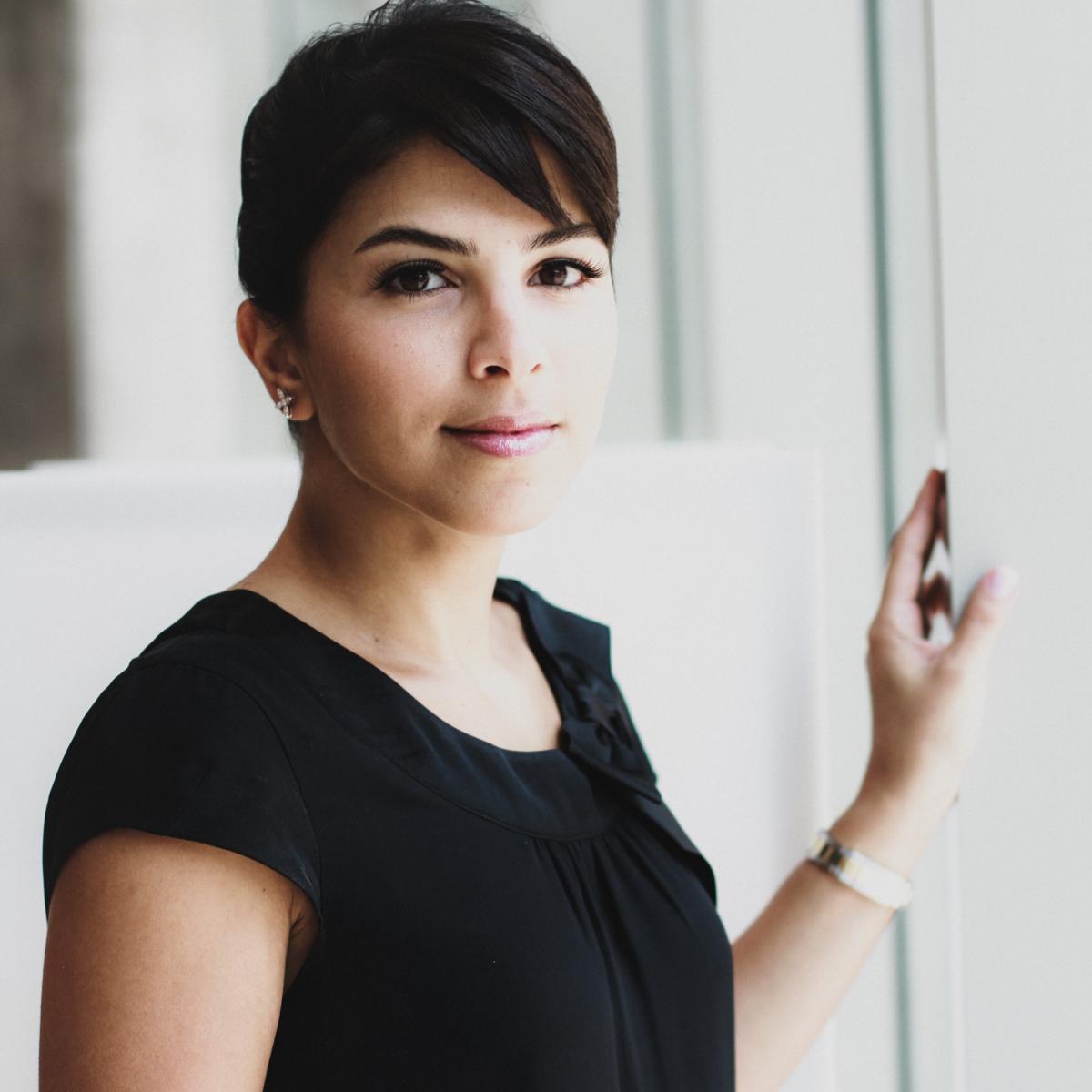This valuable resource of highly educated women is being cultivated by the UAE which has become a regional hub ripe with opportunity where many of these women come to start and advance their careers. Majalla meets with two women driving this phenomenal trend to discuss the opportunities for women in the industry, societal pressures, and how they have overcome structural disadvantages and barriers to entering the workforce and starting their own business.
Elissa Freiha, Director & Co-founder, womena®

Listed by BBC as one of their “30 women under 30” and named as one of the “Inspiring Business Leaders of the UAE” by Forbes, Elissa Freiha is a Dubai-based angel investor, motivational speaker, and the Founder of UAE-based womena®. Pivoting from an investment network into a media platform, womena® is a multi-dimensional brand with its own flagship Accelerator program as well as a Bossladies network. womena® continues to invest in women and is dedicated to women's empowerment by producing content focused on independence and promoting female founders, creatives and change-makers around the world. Driven by a passion for female empowerment and deal-making in the UAE’s SME space, the young entrepreneur of Lebanese-American descent is also a women’s economic activist.
How does womena® help the tech start up industry in the region?
Womena is first and foremost a platform for exposure and storytelling: We highlight the innovative women role models in the region and tell their game-changing stories so we can inspire the next generation. We don't just talk the talk but we walk the walk too! We launched the region's first tech accelerator for women led companies. It's called Womentum. Lastly as there is a desperate lack of networks for regional women, we launched the Bossladies Network which brings together all of the amazing women in our community through events across the region (yes, Saudi, we have events in Riyadh too!) and online.
How did you get involved with angel investing in the tech landscape and what is your investing philosophy?
I was introduced to angel investing at a young age, 23, dramatically younger than most of the investors (whose average age was 52!) I was interested in learning to invest and saw Angel investing as an opportunity to do so, as well as a way to add real value to early stage companies. I was contributing my knowledge of marketing and my networks in the region as well as the funds. I invest in early stage tech-enabled start-ups that I can fully understand and that I can add strategic value to, I also invest only in diverse teams, meaning there has to be a woman on the founding team for me to consider them. Women-led companies produce higher revenues with half the funding and often create 30% more jobs.
Do men and women have a different lens on investment?
Yes, women are more detail-oriented and invest in relatable products and services that they can fully understand. They are also more risk averse, so they spend more time on diligence. These traits actually make them better investors, and women angels statistically return higher portfolios. Men will tend to go more with their gut and prefer to invest more frequently. They won't always read the fine print on a deal and may not fully take the time to understand all the numbers or the tech behind a business.
The cultural bias against women entering technological fields appears to not exist in the Arab world. Why do you think this is?
In much of the Arab world we cannot rely on industry to provide jobs for women so entrepreneurship and self-employment are the only acceptable directions for women to take - this has led to an amazing boom in women-led businesses that utilize the internet to reach customers.
From your vantage point as a successful female entrepreneur working in a tech-heavy ecosystem, do women face any issues in the industry that are unique from the experiences of men?
Yes, women entrepreneurs, especially young women entrepreneurs, are often told their businesses are "side projects" and find it difficult to be taken seriously both by their family and the society around. Their seriousness is also questioned when they are unmarried as they are often expected to drop their businesses when they have kids. Along this line, we also see an uncomfortable level of inappropriate behaviour towards women. There is also an unspoken power dynamic that takes place when they must then go out and raise funding - cultural taboos around discussing money and negotiating their value are very obvious at this point.
How do you evaluate the tech entrepreneur environment in the UAE and what do you think it needs to flourish?
The environment in the tech space in the UAE is growing. However, the current ecosystem requires a lot of funds on the part of the entrepreneur to set up. We cannot have growing ecosystem if it's only for rich founders. Furthermore, despite very large incentives made available by the country's leadership, these resources are often mismanaged but middle-management as it trickles down to the recipients.
------------------------
Loulou Khazen Baz, Founder and CEO of Nabbesh.com

Loulou Khazen Baz is the founder and CEO of Nabbesh.com, the Middle East’s first online work marketplace which connects businesses with top quality freelancers from the world’s emerging markets with a focus on the Middle East and North Africa region. Baz founded Nabbesh.com out of Dubai with the vision to fill the gap between talent demand and supply pockets as well as encourage local businesses to hire experts from the region, creating more job opportunities and therefore a positive economic impact on the local communities while supporting women's rights within her capacity. Baz had won the regional reality TV show “The Entrepreneur” in 2012 for the Nabbesh idea, and has been working with her co-founder and team on growing the concept into a regional business.
How does Nabbesh help the tech industry in the region?
Nabbesh offers businesses the ability to find, hire and pay freelancers offering over 900 skills such as design, marketing, copywriting, technology and more. Hiring freelancers for non-core functions helps businesses achieve significant savings versus hiring the same people on a full-time basis. Whether you are a tech startup or an SME, having the ability to choose from a wide pool of talent to help you on critical tasks or to simply help you get tasks done provides the founders, owners and managers with the instant support they need and hence Nabbesh helps companies scale by helping them plug the talent gaps.
How would you evaluate your journey in the tech industry in the Middle East and what have been your biggest challenges?
I would say that I was part of the early wave of tech entrepreneurs in our region, anyone who launched a business between 2011 and 2013 has helped open a trail for today’s entrepreneurs. We had to learn the long way and the hard way as there weren’t many founders to learn from. Also, raising money was a lot more complicated, angel investors were limited and even institutional investors could be counted on 1 hand. That meant that we had a steep learning curve and we were all experimenting. So, my journey has been extremely interesting but hard, I went through hiring issues, fundraising issues, challenges on the business model, to name a few. I must say though, it has been the biggest learning in my life and one of the most rewarding 8 years in terms of both personal and professional growth.
The cultural bias against women entering technological fields appears to not exist in the Arab world. Why do you think this is?
Not exist? I disagree. I think there is a ton of hurdles for women in tech and women entrepreneurs in general. A woman has to prove herself much more than a man, she must also work twice as hard as a man as she tries to find a balance between her career and her family life. There is also the challenge of not having many women and in STEM in particular. So, as a woman, you’re usually working in a male dominated environment. Just take a look at the VCs and angel investors in our region, the majority are men. In addition to the above-mentioned challenges, there are also cultural challenges preventing women from taking risks, starting a business, being financially independent and sacrificing family time which is very much frowned upon. I think we are still far from not having cultural biases. They are very much there.
How could the tech industry in the region be more inclusive for women?
There has to be a cultural shift. It all starts at home, parents should encourage their daughters to get into STEM, to take risks, to be ambitious, to fail and keep trying, to pursue a career versus defining “success” around marriage and family. Once girls start seeing more women in STEM, starting businesses, taking risks and also having a support system starting with the parents, to the husband and her friends, she will then feel more comfortable in trying. And success breeds success: the more women succeed as entrepreneurs, more of them would end up investing back into the ecosystem and you create a virtuous cycle.
From your vantage point as a successful female entrepreneur working in a tech-heavy ecosystem, do women face any issues in the industry that are unique from the experiences of men?
I believe that both men and women entrepreneurs face similar challenges in starting up and growing a business. I do feel though that our culture is more supportive and understanding when it comes to men versus women. In addition to that, it is always harder for a woman to be an entrepreneur especially if she has a family. Luckily, we have a good support system in the UAE whereby most women have access to childcare facilities and house help, but still the woman still carries the weight when it comes to running the household and managing the kids. I also feel that in more conservative cultures, women don’t have the same opportunities to go out and network as men.
What message would you give to other women with ambitions in the technology sector? What do you wish you had known?
If you have an idea, just do it. Don’t wait, don’t overthink, don’t take permission. Just do it. Of course, this is after considering the business model, the market and the problem she is trying to solve. The first step would be to network with entrepreneurs, attend community events and perhaps join a local incubator and just give it go. What is the worst case?
Are there any particular women in tech who have inspired you?
If we’re talking 2012 when I launched Nabbesh than no. I didn’t know any women in tech. There are however many women within the business community as well as fellow entrepreneurs today that are quite inspiring and have been scaling and growing fantastic startups. We surely need more.








